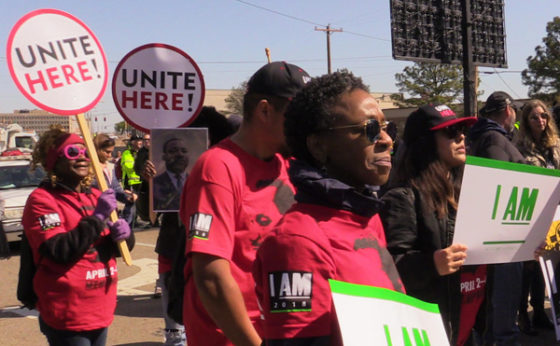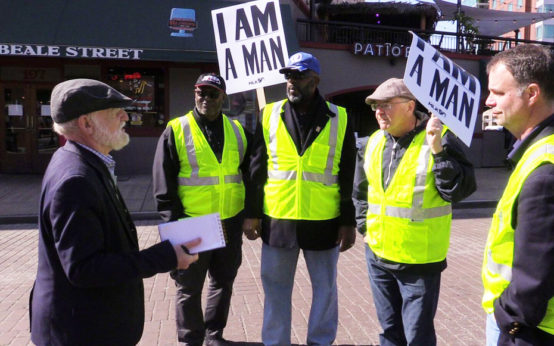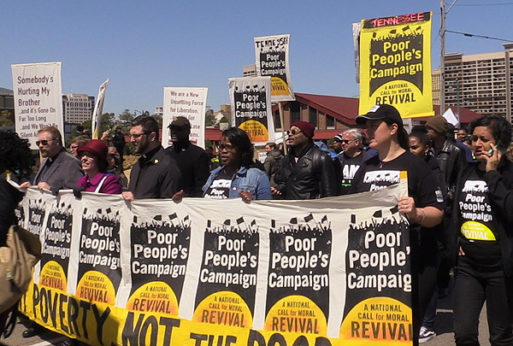
MEMPHIS, Tenn.—The so-called “economic radicalism” Dr. Martin Luther King Jr. preached in his final months before his murder 50 years ago in Memphis, Tenn., resonated with unionists and thousands of others who marched in his honor here this week – and rededicated themselves to his cause.
Speakers at the mass rally before the April 4 march began hit many of the same themes, too.
The rally, march and subsequent wreath-laying in King’s memory at the National Civil Rights Museum – the former Lorraine Hotel where he was slain—culminated three days of speeches, symposiums, calls to action and, most importantly, organizing for the causes King championed.
And there was a big political component aimed at changing the makeup of Congress in 2018. Repeated speakers urged people to register, campaign and vote for pro-worker candidates and causes and against the economic and political exploiters who now rule the White House, Congress and too many states.
The rally downtown, another at the site of King’s last speech and the march in between drew thousands of people. Organizers got a parade permit for 50,000. Memphis police low-balled the count at 7,000.

Unionists and NAACP members dominated, with labor delegations ranging from the Air Line Pilots to the Teamsters and Unite Here. That union sent four busloads from Connecticut alone, and an estimated 1,000 people overall to the series of events.
While the mainstream media emphasized King’s non-violence and his civil rights record, speakers all through the week, including at the final rally on an athletic field outside the Church of God in Christ, repeatedly highlighted his transformative economic agenda.
It’s an agenda whose modern variation features demands to end poverty and income inequality, to provide health care for all, to combat racism and to reduce excessive militarization, including among police. King’s agenda, brought forward, still is important today, speakers and unionists interviewed said.
“A lot of people don’t recognize what he (King) did for organizing and for bringing the masses together,” Ken Blair, president of Unite Here Local 217 in Connecticut, said. “Now, the media show appreciation for Dr. King. They talk about the civil rights part and ignore the rest, especially the labor part,” added Matt Biggs, legislative director for the Professional and Technical Engineers (IFPTE).
Dr. King “spoke out against the war, and the truth is the truth,” said Mine Workers Organizing Director and Vice President Jim Gibbs, recalling King’s opposition to the Vietnam War. And as for King’s other causes, Gibbs said he and his fellow Mine Worker marchers, along with other unionists “are here to support what they” – fellow citizens – “are trying to do.”

Injecting a political note – and Gibbs wasn’t the only one to do so – the UMW leader added: “We can’t stand four more years of Trump and two more years of Republicans” running the federal government. “It’s going to take a radical change at the top,” added William Barry Jr., a shop steward for AFSCME Local 137 in Worcester, Mass.
“I would highlight the war on poverty, the #MeToo movement” against workplace sexual exploitation and one other cause, said IFPTE Secretary-Treasurer Paul Shearon. “This is also bringing in new people and they’re fired up. It will be a new day for labor,” he predicted.
Pro-worker causes, including opposition to so-called right to work laws, also ran through speeches and among interviewees. Tennessee, like the rest of the South, is a so-called right to work state. Arkansas, just across the Mississippi River, enacted the first RTW law in 1944, for racist reasons: The white employer elite did not want black and white working-class people to unite. Such laws have spread to 26 other states, not counting an ongoing battle in Missouri.
“Right to work is the right to exploit workers. There is low pay and no benefits,” said Barry, whose state is not RTW. “It’s not just about jobs, but about jobs that pay enough money” to live on, he added.
Speakers at the rallies hit the same pro-worker themes, though several followed them with open political pitches. One who rose above that, and who was more transformative, was Sen. Bernie Sanders, Ind-Vt. He was greeted with cheers and chants and he, at 76, walked the whole two-mile-plus route.
Dr. King “was not just a great civil rights leader, he was a non-violent revolutionary,” Sanders declared. “He wanted to transform this country morally, economically and politically. Our legacy is to follow in his footsteps and talk about abolishing militarism, racism, homophobia and sexism from America.”
That includes ensuring “a constitutional right to organize,” Sanders said, along with raising the federal minimum wage to $15 hourly. It’s now $7.25. Many cities and states enacted levels above that, though GOP-run states have vetoed local city hikes in several cases.

“You dishonor the movement and the prophet if you remember the prophet and not what he was standing for,” said the Rev. William Barber, leader of the Moral Mondays movement and a new Poor People’s Campaign. “We must not turn back, but turn up.”
That second campaign will start in a few weeks with organized peaceful civil disobedience in D.C. and state capitals, and culminate in a second encampment in Washington. Dr. King was planning the first when he died.
“It’s not about left or right. It’s about right or wrong,” Democratic National Chairman Tom Perez, a former pro-worker Obama administration Labor Secretary, told the downtown rally.
Perez also strongly endorsed the right to organize, “the importance of collective bargaining, and that health care is a right for all, not a privilege for a few.” And GOP President Donald Trump “declared war on people like myself,” said Greisa Martinez, deputy executive director of United We Dream, the lead organization of undocumented people – the “Dreamers” – in the U.S.
But Dr. King’s message of economic, political and moral transformation “is not getting through” the mainstream media, said Ernest Dow of Machinists Lodge 794 in Albuquerque, N.M. “And it’s the exact opposite case with the current administration. Their whole goal is against collective bargaining. Anything Dr. King was for, they’re against…We need to become more involved and more of us need to become activists, wherever it might be.”
That’s a goal many marchers from around the country shared. “We’ll try to get activism going, even out in rural areas,” said Carol Krohn, recording secretary for Machinists Lodge 163 in Portland, Ore. “We’ll be educating them on increasing their wages, their labor standards, their pensions and their basic human rights,” she added.
“We have to go forward and we can’t stand still,” said Tim Rudolph of IFPTE Local 195 in New Jersey. “This is a call for us to wake up,” added Kermit Moore of the A. Philip Randolph Institute.










